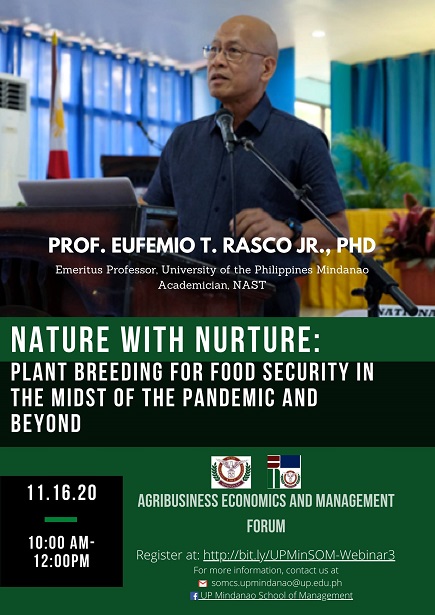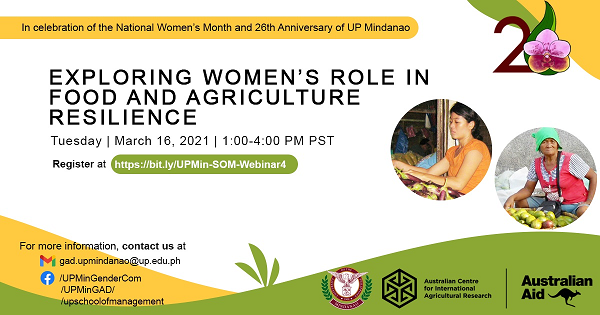 The University of the Philippines Mindanao celebrates its 25th Anniversary in 2020 and, as part of the year-long activities, the School of Management (SOM) offers free webinars to the general public.
The University of the Philippines Mindanao celebrates its 25th Anniversary in 2020 and, as part of the year-long activities, the School of Management (SOM) offers free webinars to the general public.
UP Mindanao and SOM are inviting interested persons to attend the FREE online webinar on “Nature with Nurture: Plant Breeding for Food Security in the Midst of the Pandemic and Beyond” on 16 November 2020, Monday, 10:00 AM-12:00 NN (PST). The resource speaker is Professor Emeritus Eufemio T. Rasco Jr., University of the Philippines Mindanao’s first Professor Emeritus.
To register, click the link http://bit.ly/UPMinSOM-Webinar3.
For more information, email .
POST-EVENT UPDATE:
The video of the lecture may be viewed here: https://bit.ly/3lVPit8
ABSTRACT
Recent knowledge poses thought-provoking questions about the nature of organisms and how they respond to a changing environment. A developing concept views the organism as a community rather than an individual. Indeed, a human being, for example, is really a collection of human cells and closely associated microorganisms. Various estimates show that the microorganisms outnumber human cells in a typical human body by a factor of 10 to 1! Without the associated microorganism, the human being will not survive. The same is true with plants. It is now known that many of what we consider “traits” to breed for are actually products of interactions between the plant and its associated microbiota. Thus, a new plant breeding approach might involve breeding for the associated microbiota rather than the plant directly or breeding for the combination of the plant and its associated microbiota. This new approach offers profound advantages in the face of a dynamic biological, physical, and socio-economic environment of cultivated plants. After all, it is much easier to breed microorganisms with life cycles measuring hours rather than plants with life cycles measuring months or decades.
Holobiont breeding -- as the strategy for breeding combinations of plants and microorganisms is referred to in literature -- is just one of a menu of approaches to achieve food security in the midst of environmental challenges such as the pandemic, and the much bigger one, climate change. The other strategies include diversification, intensification, and integration at the farm level, all of which suggest that traditional strategies of plant breeding focused on a few species and focused on the plant need to be re-examined.
This lecture will cover the above ideas in broad strokes and point out implications on policy, biological and plant breeding research, and education.
 The School of Management and the Office of Gender and Development invites the interested public to a webinar “Exploring Women’s Role in Food and Agriculture Resilience” on 16 March 2021 (Tuesday), 1:00 PM to 4:00 PM.
The School of Management and the Office of Gender and Development invites the interested public to a webinar “Exploring Women’s Role in Food and Agriculture Resilience” on 16 March 2021 (Tuesday), 1:00 PM to 4:00 PM.
 The University of the Philippines Mindanao celebrates its 25th Anniversary in 2020 and, as part of the year-long activities, the School of Management (SOM) offers free webinars to the general public.
The University of the Philippines Mindanao celebrates its 25th Anniversary in 2020 and, as part of the year-long activities, the School of Management (SOM) offers free webinars to the general public.